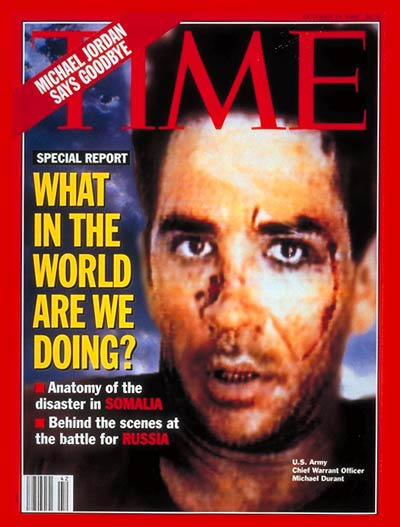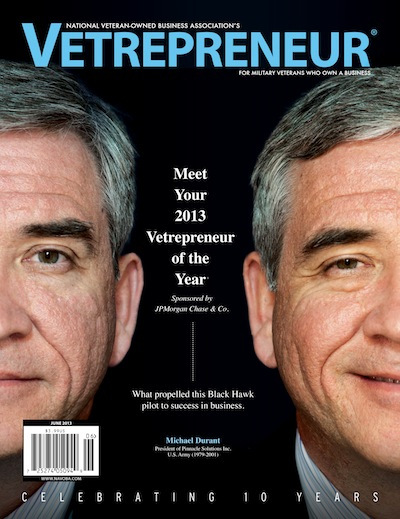Michael Durant is rushed to a waiting helicopter shortly after being freed from captivity in Mogadishu, Somalia, in October, 1993.
I was one of two MH-60L Black Hawk pilots, call sign Super Six-Four, shot down over Mogadishu in October 1993.
It happened in the midst of perhaps the most infamous U.S. battle since the Vietnam War. It ended up being told in the film Black Hawk Down. I survived the crash, but was severely injured. I couldn’t walk.
We put up a fight, but in the end I was beaten by a mob on the streets of the city. I endured 11 days of captivity by a Somali warlord.
When my captors released a video of me, I became the face of the battle. It’s a horrifying image that has endured until today, particularly as we head into the 20th anniversary of the mission this fall.
Since then, I have used my military experience and leadership skills to become a business leader as co-founder and president of Pinnacle Solutions Inc., an aerospace company based in Huntsville, Ala. Recently, I had the honor of being named the 2013 Vetrepreneur of the Year by the National Veteran Owned Business Association and Vetrepreneur magazine.
Getting from that fateful mission in 1993 to where I am today has been an interesting journey…
Back in 1988, I decided to get into Special Operations. It was a decision that led to me flying with arguably some of the best aviators in the world. I flew in the Persian Gulf in Operation Prime Chance. I also went to Panama and took part in Operation Just Cause, which ultimately deposed Panamanian dictator Manuel Noriega.
In 1991, I was deployed to Operation Desert Storm and then in 1993, I ended up in Somalia.
Officially called Operation Gothic Serpent, the mission put U.S. Special Operations Forces, which are made up of U.S. Army Rangers and Delta Force commandos, in Somalia to target and capture approximately 50 people associated with the militia of warlord Mohamed Farrah Aidid. The militia was creating famine in the country by seizing food supplies during the country’s civil war.
It was a manhunt in what, at times, were the most dangerous places in Mogadishu. On the seventh mission we encountered heavy resistance.
Task Force Ranger ended up with 19 dead, 74 wounded — and me captured.
I spent the next 11 days in captivity, which is chronicled in my book, In the Company of Heroes.
After I was released, the doctors told me I’d never fly again, so I decided to prove I was capable by running a marathon. I trained for 10 months and on race day was able to finish the 26.2 miles in 3 hours and 37 minutes.
At the finish line, all I could think about was getting back in that cockpit.
My request for a waiver was approved by the chain of command. I was able to regain my flight status and fly with the 160th for five more years.
It was a remarkable journey, but in some ways just the beginning. I took advantage of the time I spent grounded and completed both a Bachelor and Master of Business Administration Degree from Embry Riddle Aeronautical University. By the time I was ready to retire after 22 years in the Army, I was ready for the next phase of my life and decided Huntsville, Ala. was an ideal place to launch a second career.
I initially went to work for a small company. It was very similar to the Special Ops world; everyone had a lot of responsibility and autonomy. However, that company was purchased by a larger business and I wasn’t a fan of the large business culture I found myself in. For the first time in my life I didn’t like my job.
In 2008, I decided to start Pinnacle Solutions. The company’s product and service lines fall into three primary buckets: training systems development and modifications, engineering services and logistic support analysis and services. The company has had steady growth from the start and I believe that 2013 will be another big growth year.
In addition to the work at Pinnacle Solutions, I still do quite a bit of motivational speaking. I talk extensively about how those experiences from not only Somalia, but also from all of my military experience, can impact success in any business.
People make our military and Special Operations great. At Pinnacle, we focus on people first. We’d rather leave a position unfilled versus filling it with the wrong person. Then we treat people right so we can retain them. I learned all of that in the military. I didn’t know that before I joined. I didn’t look at life through that lens, but after spending 22 years in the military, I saw great leaders and how effective organizations treat their people and that’s what we’ve applied here.
So far, it seems to be working.



